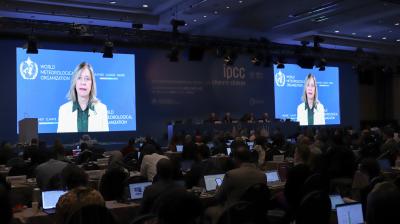Intergovernmental Panel on Climate Change (IPCC)
The Intergovernmental Panel on Climate Change (IPCC) provides governments at all levels with the most up-to-date, robust scientific information to help them develop climate policies. Created in 1988 by the World Meteorological Organization (WMO) and the United Nations Environment Programme (UNEP), IPCC reports are a key input into international climate change negotiations. As an intergovernmental entity, IPCC is made up of members of the United Nations or WMO, totalling 195 countries.
Thousands of experts worldwide volunteer to author IPCC assessment reports, assessing volumes of published scientific papers to provide a comprehensive summary of drivers for climate change, its impacts and future risks, and how adaptation and mitigation efforts can reduce those risks. An open and transparent review by experts and governments worldwide is essential to the IPCC process to ensure an unbiased and complete assessment, reflecting a diverse range of views and expertise. Through these assessments, IPCC identifies the strength of scientific agreement in different areas and guides where further research is needed. IPCC does not conduct its own research.





